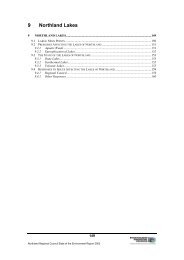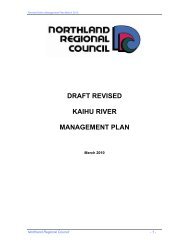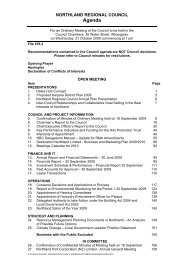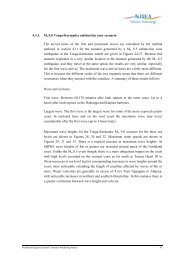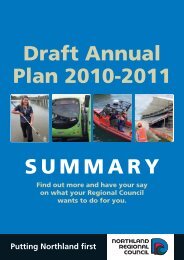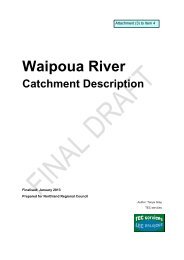Northland Civil Defence Emergency Management Plan, 2010
Northland Civil Defence Emergency Management Plan, 2010
Northland Civil Defence Emergency Management Plan, 2010
- No tags were found...
You also want an ePaper? Increase the reach of your titles
YUMPU automatically turns print PDFs into web optimized ePapers that Google loves.
8.4.5 COST APPORTIONMENTFor those costs agreed to be met by the Group, the cost will be apportioned equally between the four localauthorities (3 District Councils and regional council).In an emergency, in the interim, costs will lie where they fall, or where a territorial authority requests a resource,the cost will lie with the relevant territorial authority or where the Group Controller directs a resource, the costwill be apportioned by agreed negotiation.8.5 COOPERATION WITH OTHER CDEM GROUPS8.5.1 FLEXIBLE SUPPORT AGREEMENTSIn accordance with section 17(1)(f), the CDEM Group will support other CDEM Groups in New Zealand. The basisof this support is outlined below and is built upon memoranda of understanding which were previously in placewith neighbouring Groups.The specific nature of support that the CDEM Group can provide during the response and recovery phases of anemergency will depend on the circumstances at the time and to what extent an emergency has affected eachCDEM Group. The support outlined below will be conditional on a best endeavours basis having regard for all ofthe circumstances, and may include:Personnel (EOC staff, radio operators, rescue personnel, media liaison, other specialists)Equipment (Stock on hand of particular items or supplies or support with purchasing)Logistics management (<strong>Management</strong> of air, rail and other supply points outside of the other CDEM Grouparea that are being used for logistics transfer operations)Evacuee <strong>Management</strong> (<strong>Management</strong> of evacuees arriving from the affected area, including registration andarranging food, clothing and temporary accommodation).The Group agrees to consult on priorities for resources, which includes without limitation, equipment, material,services and personnel. Competing demands for resources are always likely to be evident, particularly where theemergency affects both parties, and active consultation to resolve competing demands and achieve optimumresources allocation will have precedence over all other mutual support.The CDEM Act (2002) (s113) provides for the recovery of actual and reasonable costs associated with provision ofassistance to other CDEM Groups.8.5.2 COLLABORATIVE PLANNINGThe CDEM Group will take all opportunities to share and co-ordinate planning and other activities for mutualbenefit, and the CDEM Group will, wherever possible:maintain regular contact with other Groups and conduct face-to-face consultation when necessary anddesirableshare all plans and procedures to facilitate a common approach to planning and to ensure that coordinationand coherency between plans of CDEM Groups is maximizeshare access to data on hazards and the risk treatment measures that are bring employed. Where CDEMGroups share a common hazard across the Group boundary, mutual agreement on risk treatment will beobtained before new measures are employed.keep others informed of training courses scheduled and access to courses will be available on a sparepermittingbasis.keep others informed of exercises scheduled and will encourage participating on the provision ofobservers from other areas.<strong>Northland</strong> <strong>Civil</strong> <strong>Defence</strong> <strong>Emergency</strong> <strong>Management</strong> <strong>Plan</strong>, <strong>2010</strong>-2015 Page 69



